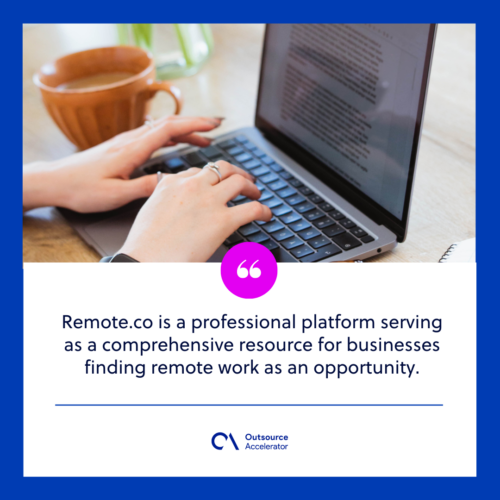The Surge of Remote Professionals: Trick Advantages for Employers and Workers
The introduction of remote experts has actually undeniably reshaped traditional workplace dynamics, presenting engaging benefits for both employers and employees. This shift not only enhances flexibility and work-life equilibrium for staff members yet additionally enables organizations to touch into a varied worldwide talent swimming pool, eventually fostering technology. The cost financial savings associated with remote procedures can substantially impact a business's bottom line. The implications of this fad extend beyond mere logistics, motivating a much deeper exam of how remote job affects performance and company culture. What variables will dictate the success of this advancing design?
Raised Flexibility for Staff Members
Welcoming remote job setups permits employees to delight in unmatched versatility in their day-to-day regimens. This newfound autonomy allows people to customize their job schedules to line up with individual commitments, enhancing work-life equilibrium. Staff members can allocate time a lot more successfully, taking care of household requirements, personal advancement, or wellness and health activities without the restrictions of traditional office hours.
Additionally, the capacity to function from numerous areas fosters a sense of freedom that can dramatically lower stress degrees. This adaptability can result in raised work contentment, as employees feel much more in control of their atmospheres and obligations. The removal of extensive commutes further improves this versatility, enabling workers to redeem valuable time that can be redirected toward both expert tasks and personal rate of interests.
Raised versatility also encourages workers to create optimum work conditions that match their private choices, whether they thrive in a peaceful office or in a dynamic café setting. This personalized technique can enhance efficiency and creativity, as individuals are most likely to engage deeply with their jobs in settings where they feel comfy and concentrated. Eventually, the change towards remote job provides a transformative possibility for staff members to redefine their expert experiences.
Access to Global Talent
The shift in the direction of remote work not just advantages employees yet also opens up new avenues for companies seeking to increase their talent swimming pool. By accepting remote job, companies can tap into a diverse series of abilities and experiences from around the world. This availability permits companies to hire top skill, despite geographical restrictions.
Accessibility to global skill boosts development and creative thinking within teams. When individuals from different social backgrounds and specialist experiences work together, they bring one-of-a-kind point of views that can bring about more efficient analytic and innovative ideas. In addition, recruiting internationally assists organizations fill up skill spaces that may exist in local markets, guaranteeing that they remain competitive in an ever-evolving landscape.
In addition, the ability to hire remote professionals can considerably improve workforce variety. A varied team not only fosters a more inclusive workplace yet additionally enhances a firm's reputation, bring in additional skill and consumers that value this content company responsibility.
Cost Savings for Companies
As organizations progressively take on remote job practices, they can understand considerable cost financial savings that directly affect their bottom line. By permitting employees to function from home, companies can decrease costs associated to office space, energies, and upkeep.
Additionally, remote job can lower employee-related costs, such as travelling reimbursements and on-site services like drinks and treats. Employers can likewise profit from a wider ability pool, allowing them to work with professionals from regions with more lower wage assumptions without compromising on credentials or skills.
Additionally, business might experience lowered staff member turnover prices, resulting in lowered recruitment and training expenses. The versatility of remote work usually converts to greater job fulfillment, which can foster loyalty and lower the expenses linked with working with and onboarding brand-new ability.

Boosted Work-Life Equilibrium
Achieving an unified work-life equilibrium has ended up being significantly obtainable for remote professionals, adding dramatically to their overall wellness. The adaptability intrinsic in remote job permits people to customize their schedules around personal commitments, such as household time, workout, and pastimes. This flexibility not only alleviates stress however likewise promotes a much healthier lifestyle.
Additionally, remote work gets rid of the usually lengthy commute, which can interfere with personal time. By reclaiming those hours, staff members can buy tasks that improve their quality of life, eventually bring about improved mental wellness. This shift towards an extra well balanced way of life can lower burnout and increase task satisfaction.
Employers take advantage of this improved work-life equilibrium too, as pleased workers are more probable to remain dedicated to their functions. An encouraging job environment that focuses on personal well-being can result in lower turnover prices and a much more natural group dynamic.

Improved Performance and Efficiency
Remote experts frequently experience right here a remarkable increase in productivity and performance, with studies showing that as much as 30% of remote employees report higher efficiency compared to their in-office counterparts. This rise can be credited to numerous aspects fundamental in remote workplace. Firstly, remote experts benefit from minimized commute times, allowing them to assign more power and focus to their jobs. The versatility of remote work additionally allows staff members to customize their schedules to come to a head performance hours, leading to finished tasks that satisfy or go beyond expectations.
Furthermore, remote job usually creates a more comfy and tailored work area, lowering distractions typically discovered in standard workplace setups. The freedom connected with remote job urges employees to take ownership of their obligations, promoting a feeling of responsibility that drives performance.

Conclusion
The relationship in between remote work and enhanced productivity, along with lower turn over prices, better strengthens the affordable edge for organizations embracing such plans. Eventually, remote work fosters an equally valuable setting.
Ultimately, the change towards remote work offers a transformative possibility for workers to redefine their expert experiences.
The shift in the direction of remote job not only benefits staff members yet likewise opens up new avenues for employers seeking to expand their ability pool.Remote professionals typically experience an amazing boost in performance and performance, with studies showing that up to 30% of remote employees report higher efficiency contrasted to their in-office equivalents. The adaptability of remote job also enables workers to customize their routines to peak performance hours, resulting in completed jobs that satisfy or exceed assumptions.
In conclusion, the shift to remote work not just improves staff member satisfaction however also considerably contributes to enhanced performance and efficiency within companies.